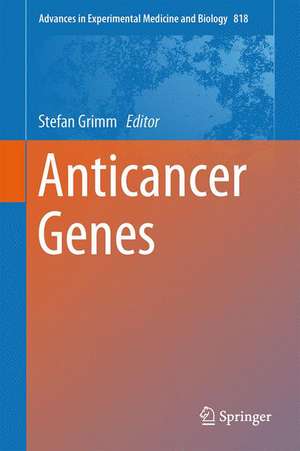Anticancer Genes: Advances in Experimental Medicine and Biology, cartea 818
Editat de Stefan Grimmen Limba Engleză Hardback – 28 iul 2014
Anticancer Genes provides an overview of this nascent field, its genesis, current state, and prospect. It discusses how Anticancer Genes might lead to the identification of a repertoire of signaling pathways directed against cellular alterations that are specific for tumor cells.
With contributions from experts worldwide, Anticancer Genes is an essential guide to this dynamic topic for researchers and students in cancer research, molecular medicine, pharmacology and toxicology and genetics as well as clinicians and clinical researchers interested in the therapeutic potential of this exciting new field.
| Toate formatele și edițiile | Preț | Express |
|---|---|---|
| Paperback (1) | 715.71 lei 6-8 săpt. | |
| SPRINGER LONDON – 3 sep 2016 | 715.71 lei 6-8 săpt. | |
| Hardback (1) | 722.69 lei 6-8 săpt. | |
| SPRINGER LONDON – 28 iul 2014 | 722.69 lei 6-8 săpt. |
Din seria Advances in Experimental Medicine and Biology
- 9%
 Preț: 719.56 lei
Preț: 719.56 lei - 5%
 Preț: 717.20 lei
Preț: 717.20 lei - 20%
 Preț: 691.93 lei
Preț: 691.93 lei - 5%
 Preț: 715.71 lei
Preț: 715.71 lei - 5%
 Preț: 1113.83 lei
Preț: 1113.83 lei - 5%
 Preț: 1031.00 lei
Preț: 1031.00 lei - 15%
 Preț: 640.24 lei
Preț: 640.24 lei - 5%
 Preț: 717.00 lei
Preț: 717.00 lei - 5%
 Preț: 820.42 lei
Preț: 820.42 lei - 5%
 Preț: 717.00 lei
Preț: 717.00 lei - 5%
 Preț: 715.35 lei
Preț: 715.35 lei - 5%
 Preț: 716.28 lei
Preț: 716.28 lei - 5%
 Preț: 716.28 lei
Preț: 716.28 lei - 15%
 Preț: 641.38 lei
Preț: 641.38 lei - 20%
 Preț: 1161.71 lei
Preț: 1161.71 lei - 5%
 Preț: 1170.51 lei
Preț: 1170.51 lei - 18%
 Preț: 1119.87 lei
Preț: 1119.87 lei - 5%
 Preț: 1288.48 lei
Preț: 1288.48 lei - 5%
 Preț: 1164.67 lei
Preț: 1164.67 lei - 5%
 Preț: 1101.73 lei
Preț: 1101.73 lei - 18%
 Preț: 1123.67 lei
Preț: 1123.67 lei - 5%
 Preț: 1435.64 lei
Preț: 1435.64 lei - 20%
 Preț: 1044.10 lei
Preț: 1044.10 lei - 18%
 Preț: 946.39 lei
Preț: 946.39 lei - 5%
 Preț: 292.57 lei
Preț: 292.57 lei - 18%
 Preț: 957.62 lei
Preț: 957.62 lei - 18%
 Preț: 1235.76 lei
Preț: 1235.76 lei - 5%
 Preț: 1231.55 lei
Preț: 1231.55 lei - 5%
 Preț: 1292.30 lei
Preț: 1292.30 lei - 5%
 Preț: 1102.10 lei
Preț: 1102.10 lei - 18%
 Preț: 1132.81 lei
Preț: 1132.81 lei - 5%
 Preț: 1165.19 lei
Preț: 1165.19 lei - 5%
 Preț: 1418.48 lei
Preț: 1418.48 lei - 5%
 Preț: 1305.63 lei
Preț: 1305.63 lei - 18%
 Preț: 1417.72 lei
Preț: 1417.72 lei - 18%
 Preț: 1412.99 lei
Preț: 1412.99 lei - 24%
 Preț: 806.15 lei
Preț: 806.15 lei - 18%
 Preț: 1243.29 lei
Preț: 1243.29 lei - 5%
 Preț: 1429.44 lei
Preț: 1429.44 lei - 5%
 Preț: 1618.70 lei
Preț: 1618.70 lei - 5%
 Preț: 1305.12 lei
Preț: 1305.12 lei - 18%
 Preț: 1124.92 lei
Preț: 1124.92 lei - 5%
 Preț: 1097.54 lei
Preț: 1097.54 lei - 15%
 Preț: 649.87 lei
Preț: 649.87 lei - 5%
 Preț: 1097.54 lei
Preț: 1097.54 lei - 18%
 Preț: 945.79 lei
Preț: 945.79 lei - 5%
 Preț: 1123.13 lei
Preț: 1123.13 lei - 20%
 Preț: 816.43 lei
Preț: 816.43 lei
Preț: 722.69 lei
Preț vechi: 760.73 lei
-5% Nou
Puncte Express: 1084
Preț estimativ în valută:
138.32€ • 143.86$ • 115.91£
138.32€ • 143.86$ • 115.91£
Carte tipărită la comandă
Livrare economică 13-27 martie
Preluare comenzi: 021 569.72.76
Specificații
ISBN-13: 9781447164579
ISBN-10: 1447164571
Pagini: 283
Ilustrații: XII, 283 p. 40 illus., 31 illus. in color.
Dimensiuni: 155 x 235 x 22 mm
Greutate: 0.59 kg
Ediția:2014
Editura: SPRINGER LONDON
Colecția Springer
Seria Advances in Experimental Medicine and Biology
Locul publicării:London, United Kingdom
ISBN-10: 1447164571
Pagini: 283
Ilustrații: XII, 283 p. 40 illus., 31 illus. in color.
Dimensiuni: 155 x 235 x 22 mm
Greutate: 0.59 kg
Ediția:2014
Editura: SPRINGER LONDON
Colecția Springer
Seria Advances in Experimental Medicine and Biology
Locul publicării:London, United Kingdom
Public țintă
ResearchCuprins
Introductory chapter.- Viral Anticancer Genes.- Signalling of apoptin.- Apoptin towards safe and efficient anticancer therapies.- Introduction of cancer-specific cell death by the adenovirus E4orf4 protein.- Tumor Suppressing Properties of Rodent Parvovirus NS1 Proteins and their Derivatives.- Cellular Anticancer Genes.- MDA-7/IL-24: Multifunctional Cancer Killing Cytokine.- Cancer-Selective Apoptosis by Tumor Suppressor Par-4.- Tumor-necrosis-factor-related apoptosis-inducing ligand (TRAIL).- SIRT6: a promising target for cancer prevention and therapy.- An Overview of Brevinin Superfamily: Structure, Function and Clinical Perspectives.- Isolation and Characterisation of the Anticancer Gene Organic Cation Transporter Like-3 (ORCTL3).- Anticancer Gene Therapy.- Introduction of Genes via Sonoporation and Electroporation.- Anticancer Gene Transfer for Cancer Gene Therapy.
Textul de pe ultima copertă
This book discusses the emergence of a new class of genes with a specific anticancer activity. These genes, recently defined as “Anticancer Genes”, are reviewed in individual chapters on their mode of action, the specific cell death signals they induce, and the status of attempts to translate them into clinical application.
Anticancer Genes provides an overview of this nascent field, its genesis, current state, and prospect. It discusses how Anticancer Genes might lead to the identification of a repertoire of signaling pathways directed against cellular alterations that are specific for tumor cells.
With contributions from experts worldwide, Anticancer Genes is an essential guide to this dynamic topic for researchers and students in cancer research, molecular medicine, pharmacology and toxicology and genetics as well as clinicians and clinical researchers interested in the therapeutic potential of this exciting new field.
Anticancer Genes provides an overview of this nascent field, its genesis, current state, and prospect. It discusses how Anticancer Genes might lead to the identification of a repertoire of signaling pathways directed against cellular alterations that are specific for tumor cells.
With contributions from experts worldwide, Anticancer Genes is an essential guide to this dynamic topic for researchers and students in cancer research, molecular medicine, pharmacology and toxicology and genetics as well as clinicians and clinical researchers interested in the therapeutic potential of this exciting new field.
Caracteristici
Provides a timely overview of the nascent field of anticancer genes, a novel concept in cancer research, emphasising their unique features and advantages Describes the achievements and challenges of the clinical application of anticancer genes Considers the opportunities to identify additional genes, and mechanisms to introduce these genes into tumor cells for therapeutic benefit Includes supplementary material: sn.pub/extras











